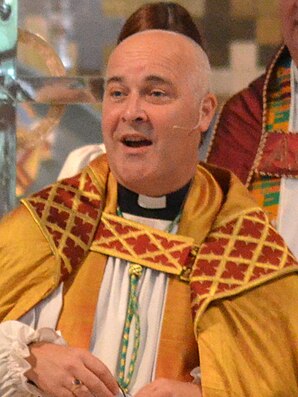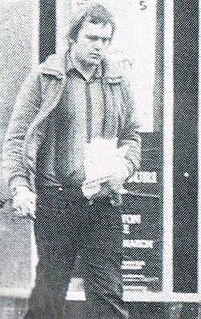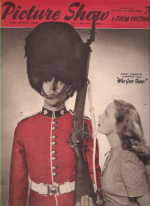
John McLoughlin, baptized Jean-Baptiste McLoughlin, was a French-Canadian, later American, Chief Factor and Superintendent of the Columbia District of the Hudson's Bay Company at Fort Vancouver from 1824 to 1845. He was later known as the "Father of Oregon" for his role in assisting the American cause in the Oregon Country. In the late 1840s, his general store in Oregon City was famous as the last stop on the Oregon Trail.
Historical fiction is a literary genre in which the plot takes place in a setting related to the past events, but is fictional. Although the term is commonly used as a synonym for historical fiction literature, it can also be applied to other types of narrative, including theatre, opera, cinema, and television, as well as video games and graphic novels.

Castell Coch is a 19th-century Gothic Revival castle built above the village of Tongwynlais in South Wales. The first castle on the site was built by the Normans after 1081 to protect the newly conquered town of Cardiff and control the route along the Taff Gorge. Abandoned shortly afterwards, the castle's earth motte was reused by Gilbert de Clare as the basis for a new stone fortification, which he built between 1267 and 1277 to control his freshly annexed Welsh lands. This castle may have been destroyed in the native Welsh rebellion of 1314. In 1760, the castle ruins were acquired by John Stuart, 3rd Earl of Bute, as part of a marriage settlement that brought the family vast estates in South Wales.

No. 452 Squadron is a Royal Australian Air Force (RAAF) air traffic control unit. It was established in 1941 as a fighter squadron, in accordance with Article XV of the Empire Air Training Scheme during World War II. The squadron flew Supermarine Spitfires for the entire war, initially over the United Kingdom and Nazi-occupied Europe. It was later based in Australia and the Netherlands East Indies, before being disbanded in 1945. It was re-raised in its current role in February 2011.
Paul Logasa Bogen was an early proponent of the Army as nation builders. He was a United States Army soldier known for his work at the Defense Intelligence Agency, the Army War College and for General Westmoreland in Vietnam. He also innovated the use of helicopters for close combat support and planned security for Khrushchev's visit to the United States in 1959.

Study hall, known as private study, SAS, structured study or free periods in the United Kingdom, is a term for a place to have a study time during the school day where students are assigned to study when they are not scheduled for an academic class. They are most commonly found in high schools and some middle schools, especially in the United States. In colleges, such a place may be called a student lounge. It is not to be confused with studying in a hallway.

The Archbishop of York is a senior bishop in the Church of England, second only to the archbishop of Canterbury. The archbishop is the diocesan bishop of the Diocese of York and the metropolitan bishop of the Province of York, which covers the northern regions of England as well as the Isle of Man. The archbishop of York is an ex officio member of the House of Lords and is styled Primate of England; the archbishop of Canterbury is the Primate of All England.
The Railway and Canal Historical Society was founded in the United Kingdom in 1954 to bring together all those interested in the history of transport, with particular reference to railways and waterways in Britain, its main objects being to promote historical research and to raise the standard of published history.

Anthony Hancock was a publisher who created literature for British far right groups and a member of such organisations in the United Kingdom.

Sinclair Pass is a high mountain pass in Kootenay National Park between the Columbia and Kootenay Rivers to the northeast of present-day Radium Hot Springs in the province of British Columbia, Canada.
Charles Logasa was an artist.
Ward, Lock & Co. was a publishing house in the United Kingdom that started as a partnership and developed until it was eventually absorbed into the publishing combine of Orion Publishing Group.

Le Roy Edwin Froom was a Seventh-day Adventist minister and historian whose writings and interpretations are a cause of much debate in the Adventist Church. He also was a central figure in the meetings with evangelicals that led to the producing of the theological book, Questions on Doctrine which easily qualifies as the most divisive book in Seventh-day Adventist history.
George Dow was an employee of the London and North Eastern Railway (LNER) and British Railways known for his public relations work and railway maps produced for his employers, and also a writer of railway literature, in particular his three-volume history of the Great Central Railway.
Richard I of England has been depicted many times in romantic fiction and popular culture.

They Who Dare is a 1954 British Second World War war film directed by Lewis Milestone and starring Dirk Bogarde, Denholm Elliott and Akim Tamiroff. The story is based on Operation Anglo that took place during World War II in the Dodecanese islands where special forces attempted to disrupt the Luftwaffe from threatening Allied forces in Egypt. It was released by British Lion Films and in the United States by Allied Artists. The title of the film is a reference to the motto of the Special Air Service: "Who Dares Wins".
Joyce Reason was a British author of missionary biographies and historical fiction for young readers.

Who Goes There! is a 1952 British comedy film directed by Anthony Kimmins and starring Nigel Patrick, Valerie Hobson and George Cole. The film depicts the farcical activities of the various inhabitants of a grace and favour house near St James's Palace in Central London.
This is a summary of 1954 in music of all genres in the United Kingdom.

The Anti-Submarine Division its original name, was the former anti-submarine warfare, planning and prevention Directorate of the Admiralty Department from 1912-1963.











